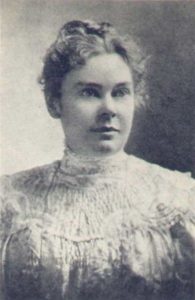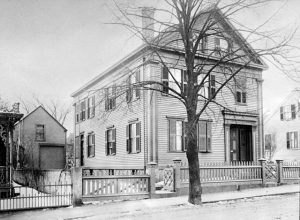[Editors note: This was updated from last year to correct punctuation, grammar, updated sources, and suggested reading.]
Lizzie Borden took an axe
And gave her mother forty whacks;
And when she saw what she had done
She gave her father forty-one.
The sensational murder trial of Lizzie Borden would galvanize the nation but ended up in her acquittal in 1893.

Circa 1889, photographer unknown
Public Domain via Wikimedia Commons
Lizzie Borden and her older sister Emma were the daughters of a well-to-do businessman Andrew Borden of Fall River, Massachusetts. Their mother died when they were young, and he married Abby Gray who ended up raising them to adulthood. Their father, though wealthy, was not liked by a lot of people in the community. He was seen as both parsimonious (a fancy word meaning excessively frugal) and dour. Both daughters grew to dislike their stepmother believing she was trying to enrich herself over their father’s money. Lizzie was well liked in the community and involved in charitable works. Both daughters helped manager their father’s properties.

Public Domain via Wikimedia Commons
On Thursday 4 August 1892, Andrew Borden left home to conduct business. In the home was the maid Bridget Sullivan, his wife Abby, and his daughter Lizzie. Emma was out of the home on business of her own. Andrew would return later than morning and lie down on the couch to take a nap. Lizzie would him dead on the couch around 11:15 am. His head had been repeatedly hit by a sharp object and there was considerable amount of blood. Police were summoned and it was during this time it was discovered the stepmother was found dead face down in the guest room. Her head had been horribly mutilated. Police interviewed Lizzie but she gave conflicting statements. A search of the basement found two hatchets, two axes, and a hatchet-head with a broken handle with the latter the suspected murder weapon. It appeared to have been coated with ash and other things to make it look like it had not been used for a while.
The police failed to make a full search of the house at the time. Lizzie went to stay with a friend of her sister. Later she was seen by a police officer detailed to guard the house entering the cellar with this friend and seemed to be hunched over a sink. The police learned that Lizzie had tried to get hydrocyanic acid in a diluted form from a drugstore. There had been a recent mysterious illness in the home that raised the possibility of poisoning. Both bodies were tested and found no poison in them. The illness may have been food poisoning from contaminated meet rather than a deliberate poisoning. However, since Andrew Borden was not well liked, his wife had suspected that perhaps someone in Fall River had poisoned them.
The police focused on Lizzie Borden as the likely suspect due to her contradictory statements, the attempt to purchase a poison, the burning of a dress, and the hatchet-head that was found during a more through search later on. She would be arrested and formally indicted in December 1892. However, her trial would not begin until June 1893. Just before her trial started, another sensational murder done with an axe occurred. It bore striking similarities to the Borden case but a suspect was caught and arrested. It was on the minds of many in the courtroom when the trial started.
Unfortunately for the prosecution, all the evidence they had was circumstantial. There was no direct proof she had handled the axe that killed the Borden parents. Nor was the burning of a dress she said had been covered in paint as well proof she did the murder. While everyone knew she and her sister did not like her stepmother much, proving she had done the murders was hard to do. The police had failed to gather any fingerprints. This had become more common especially in Europe, but the local police didn’t believe in its use. So, they lacked any fingerprint evidence that might have helped in prosecuting Lizzie Borden. And the jury as a result acquitted her on 20 June 1893 since the evidence was not strong enough to convict on.
Aftermath
Lizzie Borden would continue to live in Fall River for the rest of her life, though in a different home with her sister Emma. Both sisters, after all the probate was concluded, received their inheritance from their father’s estate. Lizzie changed her name to Lizbeth A. Borden. The new home they moved into was more modern and they also have live -in servants and a coachman. Fall River mostly ostracized her and apparently had little involvement in the community afterwards. Her sister Emma would move out in 1905 after they argued over a party Lizbeth held for an actress. Emma would never see her sister again. Both sisters remand reclusive until they both died. Lizbeth died of pneumonia on 1 June 1927. Emma died 9 days later at her home in New Hampshire from chronic nephritis as a result of a fall she suffered ironically on the day her sister died. Both are buried in the family plot at the Oak River Cemetery in Fall River.
Speculation over the murders continues to this day with Lizzie the prime suspect. Motivations for the murders, aside from disliking the stepmother are many. Highly speculative theories exist without much or any proof offered. There is an unproven allegation that the maid on her death bed many years later that she had changed her testimony to help Borden. John Morse, Lizzie’s maternal uncle, was sleeping in the house the night before, was also considered a suspect by the police but had an alibi that disproved in their eyes he was the murderer. The maid Bridget Sullivan is considered a suspect as well. It is thought she may have gotten angry with them over tasks they asked her to do and killed them. One author has suggested it was William Borden, Andrew Borden’s illegitimate son who had tried to extort money from his father Emma too is considered a possibility as she secretly snuck into the house, killed her parents, and then quickly returned to Fairhaven to receive the telegram of her parents’ murders.
The Borden House still stands as both a museum and a bed and breakfast. The Fall River Historical Society has pieces of evidence used in the trial at the Fall River Historical Society.
Sources
Crime Museum, LLC. (2021, May 18). Lizzie Borden – Crime Museum. Crime Museum. https://www.crimemuseum.org/crime-library/famous-murders/lizzie-borden/
Lizzie Borden. (2024, February 22). Biography. https://www.biography.com/crime/lizzie-borden
Mullen, M. (2021b, August 3). Lizzie Borden’s parents found dead. HISTORY. https://www.history.com/this-day-in-history/borden-parents-found-dead
Lizzie Borden. (2023, May 5). Official Lizzie Borden House. Home – Lizzie Borden. https://lizzie-borden.com/
Suggested Reading
Miller, S. (2019). The Borden Murders: Lizzie Borden and the Trial of the Century. Yearling.
Spencer, W. D. (2022). Lizzie Borden Uncut: A Casebook of Theories.
Robertson, C. (2020). The Trial of Lizzie Borden. Simon & Schuster.
Titanic News Channel is a participant in the Amazon Services LLC Associates Program, an affiliate advertising program designed to provide a means for sites to earn advertising fees by advertising and linking to Amazon.com.

